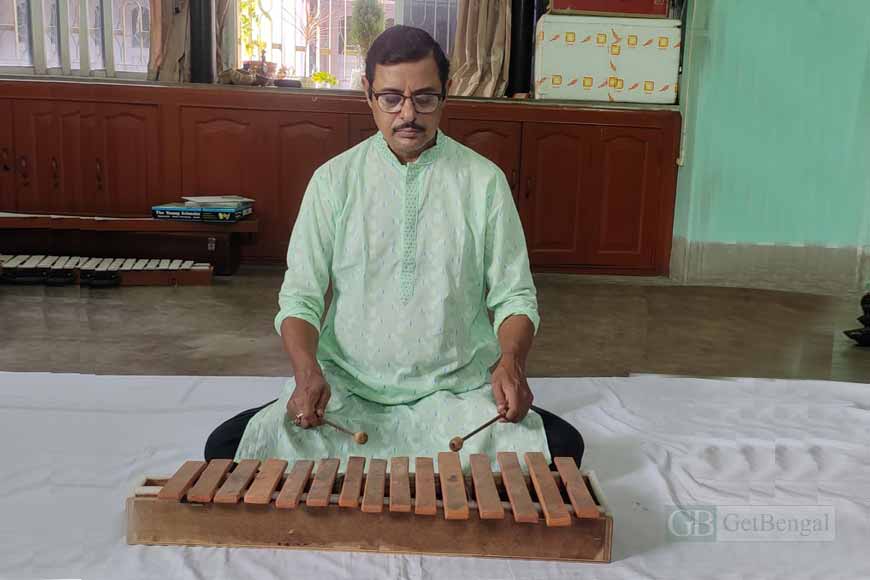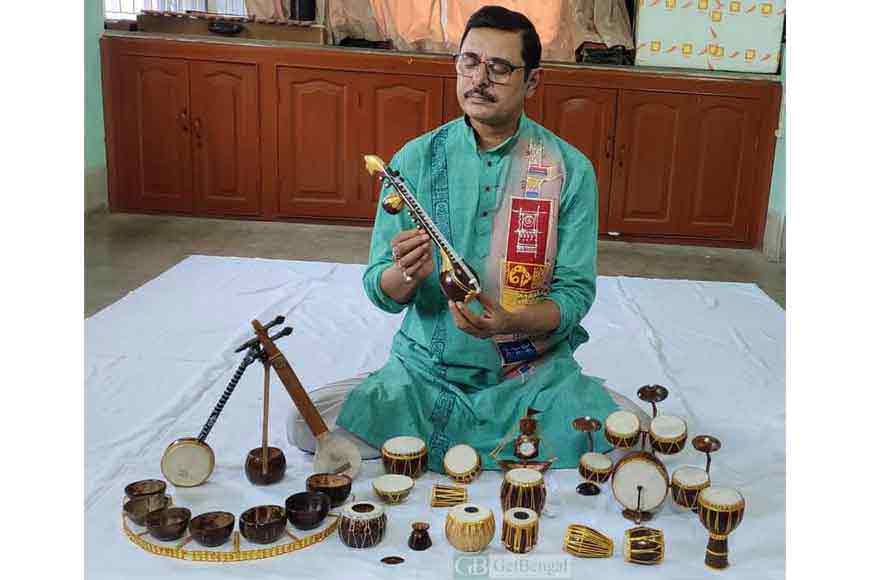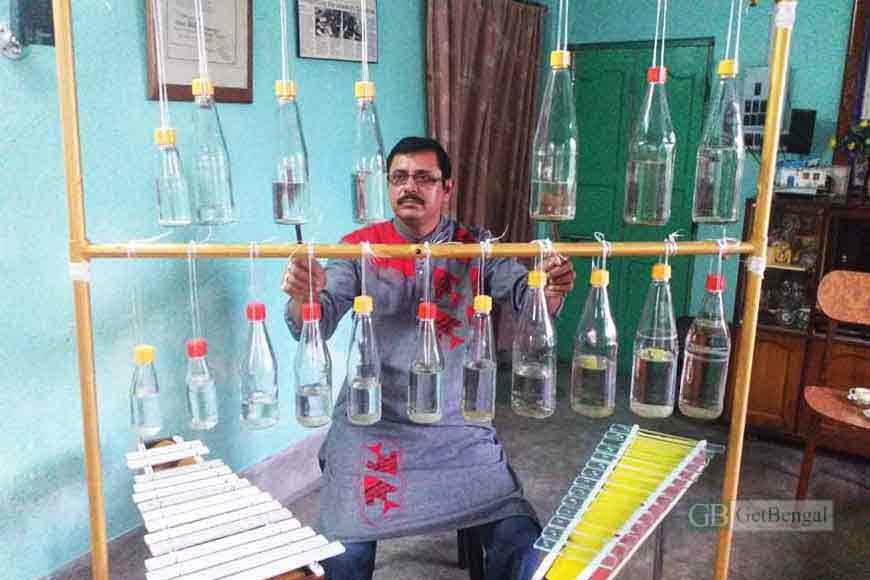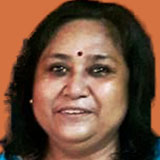From Baans to Bottle Taranga, Somnath Bandopadhyay creates musical instruments

"It's easy to play any musical instrument: all you have to do is touch the right key at the right time and the instrument will play itself….” That’s what renowned German composer and musician Johann Sebastian Bach had once said. True to what Bach said, gifted musician, Somnath Bandopadhyay loves musical instruments as if they are his friends. Son of renowned instrumentalist Nirod Baran Bandopadhyay, Somnath inherited the right genes and he, along with his elder brother, were initiated into the world of music by their father at a very young age.
Somnath Babu was born in 1968. From his childhood, he watched his father tinkering with knick-knack items, toiling to capture the distinct melody of each material and transforming them into musical instruments. Bandopadhyay took his sons under his wings and taught them all about music and the techniques of making myriad musical instruments.
While speaking to GB, Somnath reminisces his dad. Nirod Baran Bandopadhyay was an accomplished musician and tinkered with various musical instruments. He played the shehnai very well and often performed at Kirtans but he wanted to explore with musical sounds. His quest led him to xylophone, a musical instrument of the percussion family. The xylophone consists of metal bars which are struck with a beater or mallet and taking cue from this, young Bandopadhyay created his own version of indigenous xylophone with wooden bars struck by mallets. This was way back in 1948 and soon his long association with Timir Baran began. Timir Baran, regarded as ‘Father of Indian symphony orchestra’ was a talented composer who brought Indian movie music out of the influence of theatre and enabled it to acquire its own distinct identity. Bandopadhyay became his chief assistant.
In 1952, Bandopadhyay accompanied Timir Baran on a six-month world tour. Newspapers and journals in Europe wrote about Bandopadhyay’s unique musical instrument and his melodious renditions at the concerts. In 1958, he played his instrument at the Melody of Rhythm. He toured extensively with Pandit Ravi Shankar as well. By then, he was a familiar name in the musical circuit. He worked in numerous films and composed the music of a Bengali feature film, Lakshmi Narayan in 1960.
Bandopadhyay’s meteoric rise to fame continued till 1965 and then he had an accident in 1968 and his professional career came to an abrupt end. Somnath Babu was born in 1968. From his childhood, he watched his father tinkering with knick-knack items, toiling to capture the distinct melody of each material and transforming them into musical instruments. Bandopadhyay took his sons under his wings and taught them all about music and the techniques of making myriad musical instruments. Meanwhile, owing to the family’s increasing financial crisis, Bandopadhyay’s friend arranged for a job for Somnath Babu’s mother. But her work station was at Serampore and she took her two sons and relocated at Serampore. Their father remained in Kolkata though. Somnath and his elder brother’s musical journey came to an abrupt end as they moved on with their mother.
The family union at Kolkata was something the siblings looked forward to. Somnath Babu recounts an anecdote from his boyhood. “The year was 1976 and I was barely eight years old. My father took us to buy a huge tolta-bansh (a kind of huge bamboo with large hollow in the intermodal regions of the stem). He cut the bamboo into pieces and then left them in the open to age. After six months he cut thin strips of bamboo in varying sizes and made an instrument for us!” He named the instrument Bans-taranga. The instrument was a variation of the wooden xylophone that Bandopadhyay had created in his youth. He told them to practice on the new instrument because the wooden xylophone had to be carefully tuned with wax for precision. Bandopadhyay also made a Dotara fashioned on the design of Sarod.

Somnath Babu and his brother mastered the art of playing the Bans-taranga and often performed at public shows which were held frequently in the city then. However, their father died in 1982 and they moved permanently to Serampore. Their musical association with Kolkata decreased gradually. Somnath Babu started college in 1985. He played the Bans-taranga one last time at the freshers’ welcome programme and did not touch the instrument for a long time. After college, he scurried through various professions and finally settled for a job in the garments sector. By then he had given up music for good.
Also read : Is Ektara also played in Rajasthan and Sind?
Somnath Babu decided to recycle household items like empty plastic and glass bottles and bowls. He scavenged footpaths and bins for these but was not satisfied with the sound that was created. Finally, his wife suggested him to use an empty glass sauce bottle and hey presto! Bottle-taranga was born! He gifted this instrument to his son, Saptarshi on his birthday.
His marriage to Gita changed his life. “She is a school teacher and she discovered about my father’s illustrious career as a musician and how I too played. She goaded me to start afresh,” remembers Somnath. Somnath Babu is immensely grateful to his wife and says he would have led a mundane existence had it not been for her. She suggested him to organize a classical musical programme and revive his father’s memory and his invaluable musical contribution. Somnath Babu organized the inaugural programme in 2010 where he played the Bans-taranga after years and mesmerized his audience. The show was a hit from the word ‘go’ and now has become an important annual cultural event at Seramore. Somnath Babu organizes the jam-packed musical soiree at an auditorium and distinguished guests from the world of music attend the show.
In 2015, while revamping his house, he stumbled upon something. He was using ceramic tiles to replace the cemented flooring. He recollects a day when work was in progress. He suddenly heard a labourer drop a piece of tile. “The musical sound that emanated from the tile was so striking that I went and asked the man to repeat his action with a few more pieces. The poor man thought I would scold him for breaking the tile and he was immensely apologetic. But I assured him that no harm would come. I later got the tiles cut and filed in the required shape and placed them on a hollow box of the Bans-taranga. When I tried playing the new instrument I was amazed by the rich and melodious sound of the instrument. This was a turning point in my life and I found my life’s mission in making indigenous musical instruments.”

Somnath Babu decided to recycle household items like empty plastic and glass bottles and bowls. He scavenged footpaths and bins for these but was not satisfied with the sound that was created. Finally, his wife suggested him to use an empty glass sauce bottle and hey presto! Bottle-taranga was born! He gifted this instrument to his son, Saptarshi on his birthday. Saptarshi is also musically inclined and plays the instrument like a pro. Although he is now studying in Class VIII, he is already turning into a budding artiste. During the lockdown period, Somnath has been imparting him music lessons and he too, is learning the art of making musical instruments from his father. The tradition continues.
The pandemic has opened up a new musical horizon for the family -- Making exquisite miniature replica of musical instruments with coconut shells including Veena, Sitar, Sarod, Dhol, Dhamsa and Ektara. His interest in craft stems from making decorative pieces for the annual Annapurna Puja held in their house since 2000. During the lockdown, this hobby turned into passion. The magnificently decorated miniature musical instruments are an instant eye-catcher. Somnath forges these only for the joy of creation, he insists humbly but now he is flooded with requests to make and sell them commercially. The offer has put him in a dilemma. His creative thirst is not satiated yet and he is always on the lookout for newer avenues to channelize his passion for creativity.











